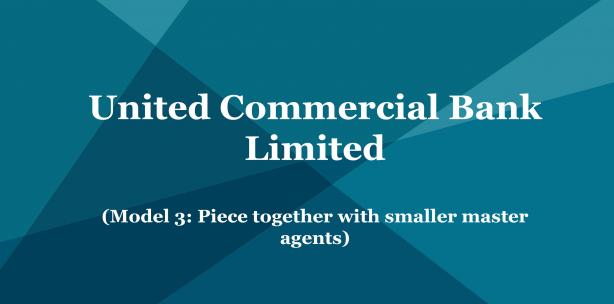
United Commercial Bank Limited (UCB) is reported to have 149 branches and 101 ATMs in Bangladesh. In November 2013, it launched UCash, which it designed to offer interest bearing deposit services, as well as domestic person to person (P2P) transfers to new and existing customers. UCB originally wanted to build its own agent network so it could maintain a high level of control over its agents, ensuring both compliance with Bangladesh Bank regulations, and a high level of service for customers. Therefore it went about recruiting a team with distribution experience, hiring 12 area managers and 30 territory managers to operate under them.
Download the full case study by clicking on the 'download' button
UCB then instructed the team to recruit wealthy and influential business people with distribution experience in Fast Moving Consumer Goods (FMCGs), or telecommunications to set-up a master agent model (master agents are called distributors in Bangladesh). The team recruited 10,000 agents to start with, and had very low activity rates of 10-12% on a 30-day basis. However, after 13 months of operations, UCB was able to build an agent network of 40,000 agents, and raise their activity rate to 30% (12,000 active agents) on a 30-day basis[1] using this model.
To keep tight control over the network, UCB developed a process whereby they gave master agents specific criteria for agent selection, so that master agents could then propose agents, who UCB would be able to review and confirm. Training is scheduled by UCB on a monthly basis, for retailers that qualified as new agents, and branding is developed at the head office by the marketing team and then distributed by the master agents to the agents. UCB also uses its team of Territory Managers to monitor the quality of agent performance with regular visits to their outlets.
Liquidity management is carried out through UCB branches, where each master agent must have an account. They are given e-float against their deposit, which they deliver to agents either on a regular schedule, or on demand when they are called to do so. Commissions are then paid in real time to distributors in e-float as transactions are made. Of the revenue generated from transactions at the agent level, the master agent receives 26% and the agent receives 50% directly.
In June 2014, while still aggressively growing its master agent model, UCB decided to augment its distribution management by outsourcing to a 3rd party specialist as well. Grameenphone, the largest telecom provider in the country, approached UCB and explained it was offering agent network management services under a new brand called MobiCash. UCB saw this as an opportunity to partner with a brand that is recognized and trusted across the country, and also has the infrastructure and experience to build a large agent network.
UCB sees MobiCash as a partner as opposed to a competitor and notes that the partnership has resulted in a 10-12% increase in its transaction volumes. However, UCB will continue to grow its own direct channel using its master agent model. Therefore both models will co-exist for the foreseeable future. UCB is also evaluating offers from Banglalink and Robi, two other big telecom providers in Bangladesh, which are proposing to offer similar services to MobiCash.
For UCB, having more agents gives it the ability to reach a bigger market with the diversity of services they would like to offer through UCash. Having some agents managed directly by their master agents gives them a high level of control over that portion of the channel, while the partnership with MobiCash, and potentially other telecom providers, takes them closer to the ubiquitous national level they desire.
[1] On a 90-day basis 22,000 agents are active.





